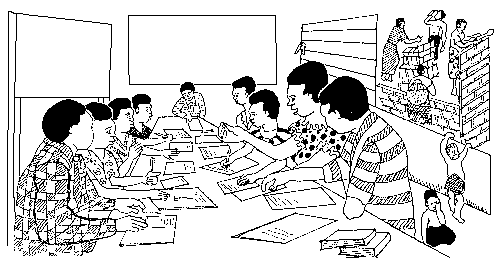Tweet
Translations:
'العربية / Al-ʿarabīyah
Català
Deutsch
English
Español
Filipino/Tagalog
Français
Ελληνικά / Elliniká
हिन्दी / hindī
Italiano
Português
Română
Српски / Srpski
Türkçe
اردو / Urdu
Other formats:
Other Pages:
Modules
Site Map
Key Words
Contact
Utility Documents
Useful Links
Contents:
Contents:
Contents:
Contents:
WRITING REPORTS
A Guide for Community Mobilizers
by Phil Bartle, PhD
Core Document in the Module
Abstract:
This module asks the questions: "Why?" should reports be written, "to Whom?" do they go, and "What?" should be included, then goes on to discuss the "How?" they can be written well, to be useful.
It is for community development field workers, social animators, facilitators of self help, community management trainers, capacity strengthening trainers and other mobilizers working to encourage and train low income communities to solve their own problems, to identify their own resources, and to plan their own development.
While it is directed towards the field workers or mobilizers, it also discusses how CBOs (Community Based Organizations) whose capacity are being strengthened, how to write community self help project progress reports.
Field workers can use these notes, therefore, not only to write their own reports, but also to train CBOs how to write community progress reports.
Introduction:
Community field workers have the admirable (but not so easy) task of organizing communities to unite, identify their priority community needs, and become organized well enough to identify and mobilize available resources so as to implement community projects.
- Within their set of tasks, there are two kinds of reports:
- Reports by themselves as animators, to communicate their own progress, their achievements,
- and recommendations about their animation and training work; and
- Reports about the community activities and projects, not written by the animators but by
- representatives of the communities; with the training and guidance of the animators.
- This document is aimed at animators, to:
- Write their own reports about their animation activities, and
- Assist communities to write their community project progress reports.
- Another distinction to make is in the content of their reports. Although they can be combined, reports can include:
- Narrative Progress Reports (relating to objectives); and
- Financial Reporting and Accountability.
This document emphasizes the "why" and "how" of narrative reporting, but makes some reference also to the need for financial reports. This appendix has four parts, as follows:
- PART A: Why Write Reports?
- Purpose
- Reason
- The Need for Reports
- Who Benefits?
- How Do They Benefit?
- PART B: Who Should Receive Them?
- Audience or Target
- Write for Your Readers
- Why Do They Need Them?
- Distribution
- For Whom are Reports?
- PART C: How to Write Reports:
- What Contents?
- What Topics?
- What to Include?
- Chapters?
- Emphasis? (Activities and Results)
- PART D: Writing Better Reports:
- Skills
- Tips
- Organization
- Style
- Clarity (Concise and Simple)
PART A: The "Why" of Report Writing:
Link to Part A: Why Write Reports?
- Some Discussions With Mobilizers
- Monitoring and Report Writing
- Project Progress Reports
- Field Worker's Routine Report
PART B: Who Should Receive Reports?
Link to Part B: Who should Receive Reports?
- Benefits to the Author(s)
- Who Receive Reports?
- How Do Recipients Benefit?
PART C: How to Write Reports:
Link to Part C: How to Write Reports.
- Different Objectives; Different Reports:
- Reports in General:
- Monthly Progress Reports:
- Community Project Reports:
- Mobilizers' Routine Reports:
- Field Trip Reports:
- Meeting Reports:
- Workshop Reports:
- What Topics Should Be Included?
PART D: Writing Better Reports:
Link to Part D: Writing Better Reports.
- What is A Good Report?
- A Report Must be Easy to Read:
- Tips on Writing Better Reports:
- What Makes A Report Good?
Conclusion:
Remember that writing reports need not be boring, look upon the task as a challenge. Emphasize results over activities. Go beyond description; be analytical.
Know your audience and the needs of your readers. Write in easy to read, simple language. Avoid the passive voice. Write concisely (briefly but completely). Organize your reports by using an outline and by using subtitles. Write several drafts before the final one.
By using these tips and guidelines, you can teach yourself and your community clients to improve your report writing.
Remember, it is not necessary to be bad to get better.
––»«––
Report Writing Workshop:
 |